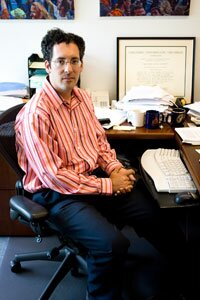FACETIME- Garrett's DNA: Man of (wrongful) convictions

Brandon Garrett
PHOTO BY WILL WALKER
Brandon Garrett is very aware that innocent people can be wrongfully convicted. He's represented them, and he wanted to see if his clients' situations were typical.
It was worse than he thought.
Garrett looked at 200 innocent people who were exonerated by DNA testing, largely through the efforts of the Innocence Project, where he worked before coming to the UVA Law School.
He found the more serious the crime– rapes and murders– the more flawed the legal process. "There were serious errors in these trials, and they were more error-prone than typical cases," Garrett says.
He discovered fallible eyewitnesses, faulty forensic evidence, lying informants, and lots of false confessions. His study, "Judging Innocence," won't be published in the Columbia Law Review until January, but already it's making headlines and pointing out troubling flaws in the U.S. justice system.
Even worse, it could be the proverbial tip of the iceberg. "In a lot of cases, there's no DNA evidence," Garrett explains. "These 200 were lucky there was biological material to test."
And once DNA testing cleared these people– who were held in jail an average of 12 years– it was still an uphill battle to get them exonerated, he says. Many had to get pardons because there was no legal forum for relief.
"He's tried to do an autopsy of these cases," says UVA law prof Richard Bonnie. "What went wrong, and why were innocent people convicted, and why weren't the errors detected before now?"
The study should help identify common errors and practices that increase the risk of convicting the innocent, Bonnie adds. "It's an important study."
Garrett, 32, didn't set out to indict the U.S. justice system and become a champion of the wrongfully convicted. He studied philosophy at Yale and wanted to paint.
Three of his paintings of the mass arrests at the 2004 Republican convention in New York adorn his Law School office wall. "I was there as a painter, not a lawyer," he says. Although inevitably, "I represented some of them."
He says he hadn't thought about a career in law before college, when he started working with homeless people who had lost their benefits with welfare reform. "That's when I realized what I wanted to do," he says.
He hired on at Cochran, Neufeld & Scheck, the public interest law firm started by O.J. Simpson's attorneys, where all the cases were high profile.
"As I became more involved with the Innocence Project, I became more interested in wrongful convictions working with Peter Neufeld and Barry Scheck," he says.
So why move from the Innocence Project to university life?
Garrett always suspected he was an academic at heart, and his wife also teaches at the Law School. "We wanted to move somewhere more livable than New York," he says. And Charlottesville is closer to the D.C. suburbs where he grew up.
Does he have any advice for would-be miscreants?
If you're ever arrested for a brutal crime you didn't commit, Garrett notes: "Wait to talk to a lawyer."
#